SAN FRANCISCO — Andrew Douglass shoved his garments and belongings into plastic trash luggage as 5 cops surrounded his encampment — a colorless grey tent overflowing alongside a bustling sidewalk within the gritty Tenderloin neighborhood, the place homeless individuals lie sprawled on public sidewalks, generally in drug overdoses.
Officers gave him a selection: Go to a shelter or get arrested and cited for sleeping exterior.
Douglass was attempting to determine what to do as he dismantled his tent. If he accepted short-term shelter, he’d danger lacking an vital appointment together with his road drugs case supervisor, who was as a consequence of meet him at his tent within the morning to assist him safe a low-income housing unit with wraparound companies — and he anxious about shedding his medicines, ID, and different important paperwork once more in one other homeless sweep.
Douglass, who didn’t have a working cellphone, knew if he moved from the place he’d slept for months, his case supervisor may not be capable to discover him. “I’m so close to getting housing. I need to be here tomorrow morning so I can try and get inside,” he mentioned, attempting to motive with officers as he was handcuffed and arrested for unlawful lodging.
California, the epicenter of the U.S. homelessness disaster, is cracking down on individuals residing exterior like by no means earlier than, taking an aggressive new stance to dismantling and clearing homeless encampments within the wake of a watershed U.S. Supreme Court docket ruling in late June that makes it simpler for presidency businesses to fantastic and arrest individuals for residing on streets and sidewalks, in broken-down autos, or inside public parks — even when there isn’t any shelter or housing obtainable. From San Francisco to Los Angeles, communities are launching cleanup operations, ratcheting up enforcement of current anticamping legal guidelines, and, in some locations, passing new legal guidelines to attempt to stop individuals from residing outdoor.
On the bottom, well being care consultants and homeless service suppliers say the legislation enforcement crackdown is undercutting taxpayer investments in evidence-based therapy and housing companies which are being deployed by cities and states across the nation as politicians look to the well being care system to aggressively transfer individuals off the streets.
The sweeps — which have taken off beneath Democratic Gov. Gavin Newsom, who issued an govt order in late July requiring state businesses to take away encampments and inspiring native governments to do the identical — have unleashed chaos for homeless individuals and are breaking essential connections with well being care suppliers, social service businesses, and housing navigators attempting to assist them get wholesome and off the streets.
Newsom’s hard-line stance is undermining his signature Medicaid initiative, generally known as CalAIM, which dedicates $12 billion over 5 years partly to serving to homeless individuals obtain well being care, housing, and social companies. The experimental program, meant to stabilize essentially the most susceptible and preserve low-income sufferers out of expensive institutional care in hospitals, jails, and nursing properties, as an example, launched in early 2022 with backing from the Biden administration, and supplies state and nationwide well being care funding to road drugs groups, hospitals, medical health insurance corporations, group clinics, and different organizations to serve homeless individuals.
It comes as Newsom introduced this month that his well being secretary, Mark Ghaly, who has spearheaded the state’s infusion of social companies for homeless individuals into the well being care system, can be stepping down.
Encampment clearings are additionally upheaving long-standing federal well being insurance policies that present billions of {dollars} every year to road drugs suppliers, case administration groups, and front-line group clinic staff, together with by way of the nationwide “Health Care for the Homeless” program, which can be aimed toward serving to homeless individuals get wholesome and navigate a path to everlasting housing.
Newsom has been emphatic that streets are usually not a house and that it’s unsafe to let individuals reside exterior amid public well being hazards like rats, drug needles, and piles of trash. The second-term governor, who has threatened to withhold homelessness funding from communities that fail to indicate sufficient progress, argues that his insurance policies are serving to get individuals long-term housing and companies.
“There are simply no more excuses,” Newsom mentioned in July.
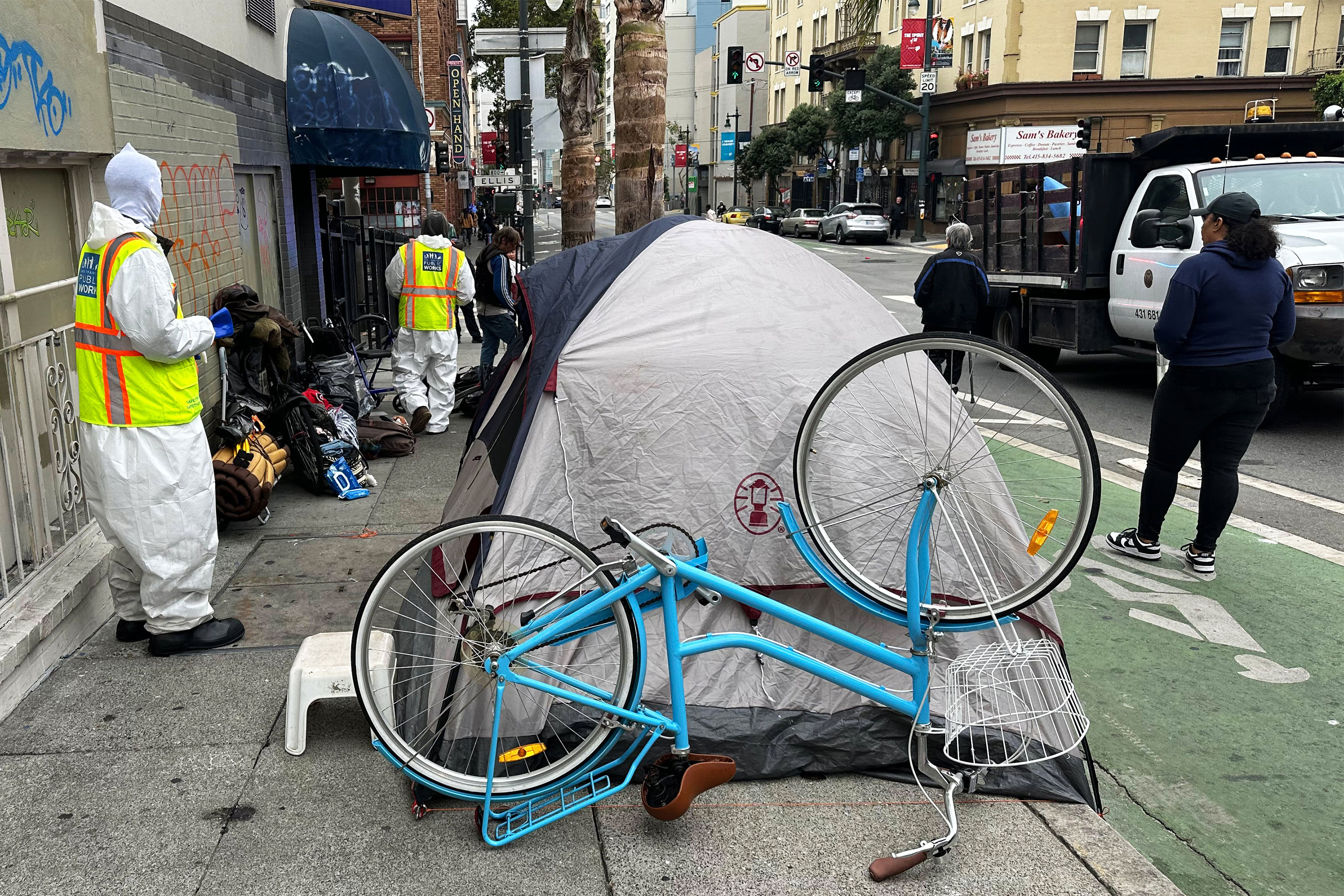
Well being care suppliers and homelessness consultants say the result’s a slow-moving well being care disaster instigated by the very Democratic politicians touting the necessity for care and companies round California, residence to extra homeless individuals than every other state within the nation.
No place goes as exhausting as San Francisco, a fiercely liberal metropolis that has lengthy embraced its repute as a spot the place homeless individuals might discover refuge and strong companies.
Now, case managers, housing navigators, and road drugs groups say susceptible individuals are rising sicker amid the crackdown and that lots of their sufferers have merely disappeared. Others have misplaced medicines and important paperwork like start certificates and Social Safety playing cards, setting again efforts to stabilize individuals with housing, psychological well being companies, and dependancy therapy. Entrance-line suppliers right here say town has grow to be a obvious instance of homelessness coverage gone incorrect.
“All the sweeps and arrests are doing is moving people to the next sidewalk and disrupting their continuity of care. It’s a huge waste of resources,” mentioned Shannon Heuklom, a main care supplier and an professional in road drugs for the San Francisco Neighborhood Well being Heart, with a clinic nestled within the coronary heart of the Tenderloin.
“Some portion of folks may end up in a shelter, but for the most part the city is just moving them all around and making them more unwell, making their mental health worse, making their physical health worse,” she mentioned.
Disrupted Care
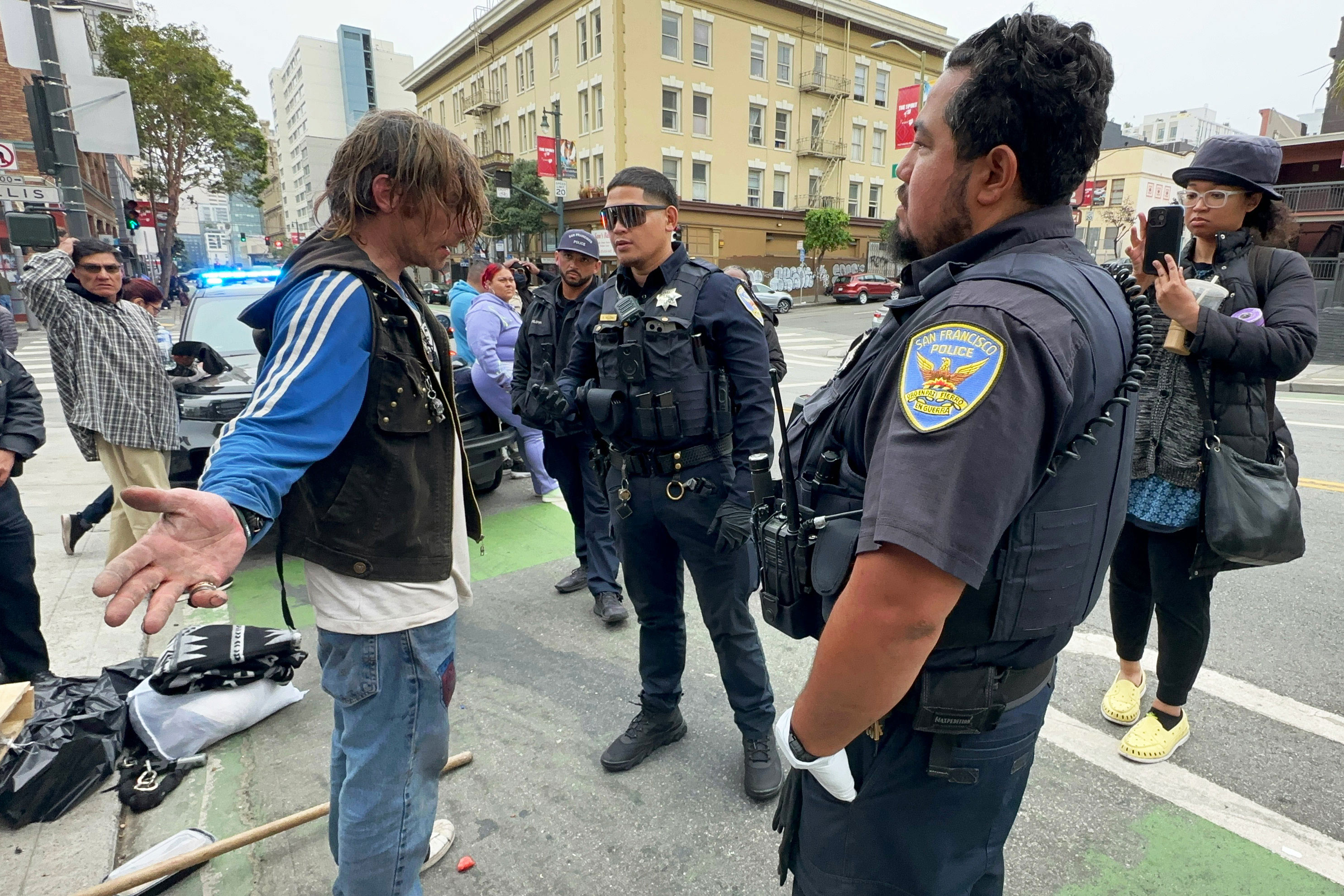
Within the Tenderloin, Douglass was frantic. Police instructed him and his spouse, Jasmine Byron, and one other accomplice, Christina Richardson, that they may keep away from arrest in the event that they went into an enormous congregate shelter. However they’d need to sacrifice most of their stuff, taking simply two luggage every. They’d already misplaced lifesaving medicines, together with for epilepsy, in a earlier camp clearing. And Douglass had lastly changed his ID and bronchial asthma treatment; he didn’t need extra stuff thrown away amid the chaos.
On this early August morning, Douglass opted to stick with his belongings. The trio are a part of about 70 homeless arrests in San Francisco for the reason that metropolis’s mayor, London Breed, ratcheted up cleanup operations to start with of August following the Supreme Court docket’s resolution in late June, based on San Francisco Police Division spokesperson Evan Sernoffsky.
“We’re here to enforce the law,” mentioned Lt. Wayman Younger, one of many 5 officers. “We get a lot of complaints: People can’t use the sidewalk; there’s a lot of garbage.”
Because the three have been separated and cuffed, a girl driving by caught her arms out her window and clapped, cheering the sidewalk arrest and yelled “Thank you!” A passerby in a wheelchair averted the tense standoff by rolling right into a site visitors lane, dodging autos as he regarded for a vacant part of sidewalk to make use of.
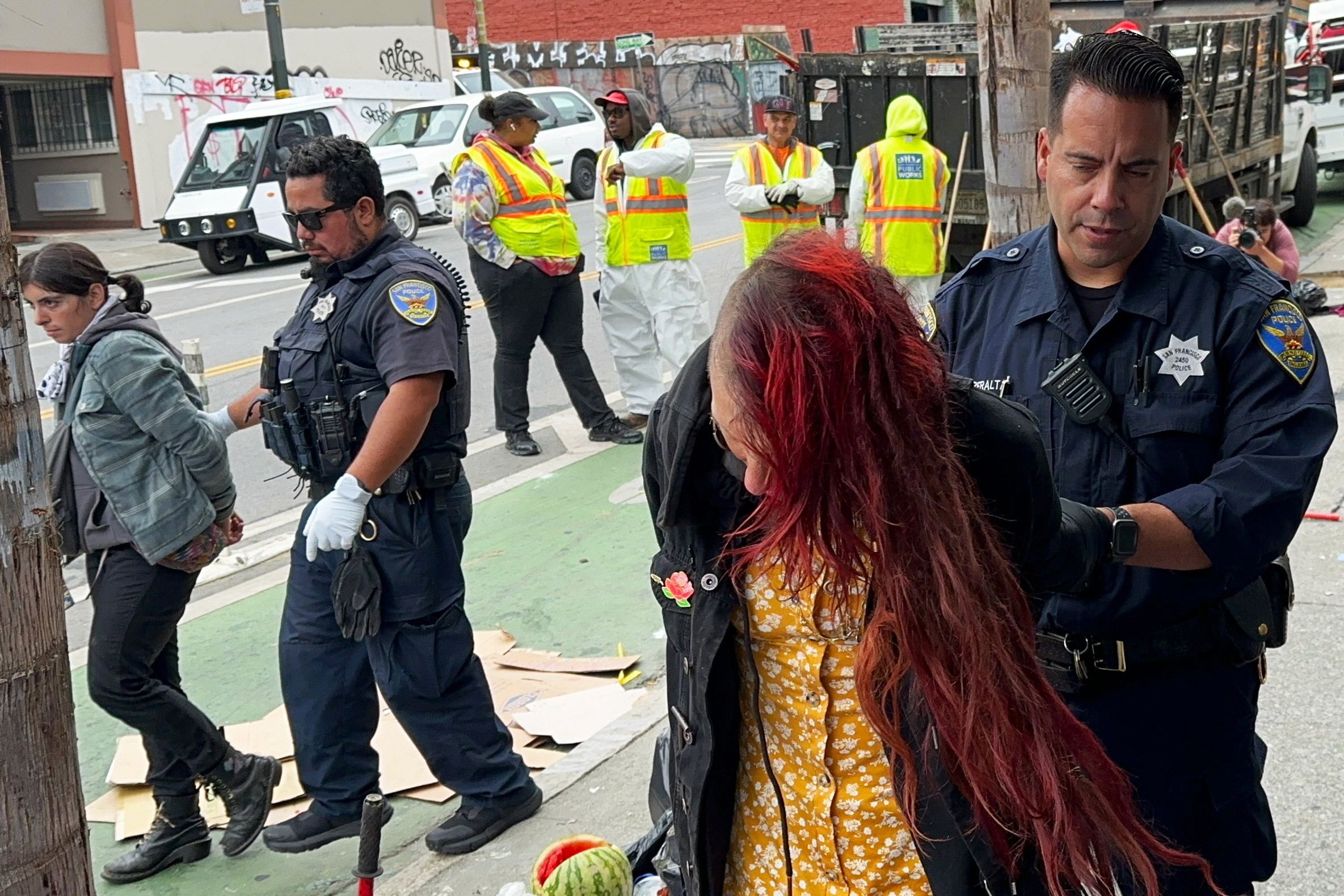
Douglass missed his housing appointment the morning after his arrest, confirmed his road drugs case supervisor, Justin Jackson from the San Francisco Neighborhood Well being Heart. Amid his tossed belongings have been his ID card, which is required to get into housing, so he was again in line on the clinic the following day filling out a Division of Motor Autos voucher type to switch it at no cost.
As a result of Douglass is homeless and on Medi-Cal, California’s model of Medicaid, he’s eligible for CalAIM companies that help homeless sufferers with discovering a everlasting place to reside, in addition to serving to to cowl safety deposits and utility payments. CalAIM additionally provides eviction prevention assist, and subsequent yr California is anticipated so as to add a brand new Medi-Cal profit offering as much as six months of free lease or short-term housing.
However together with his paperwork thrown away, his eligibility for housing was delayed.
Entrance-line staff are actually spending immense time and sources serving to individuals substitute valuables like medicines, Social Safety playing cards, and start certificates misplaced as a consequence of sweeps. They discover sufferers are skipping routine well being care and spot an uptick in drug use, nervousness, and despair.
“This is just making homelessness worse,” mentioned Evelyn Peña, a CalAIM care supervisor on the Mission Neighborhood Well being Heart in San Francisco.
Taylor Cuffaro, a nurse practitioner and road drugs supplier with the San Francisco Neighborhood Well being Heart, trudged the streets of the Tenderloin with Eli Benway, a licensed scientific social employee who supplies speak remedy and different behavioral well being therapy on the road, looking for sufferers on a vivid August afternoon.
Some wanted assist managing continual illnesses and psychological well being situations. Others have been due for antipsychotic injectables that last more than capsule medicines. Some wanted refills of HIV medicines.
“Health insurance companies aren’t just going to give you more medication,” Cuffaro mentioned. “That’s not how it works, so people really are at risk of dying faster.”
A part of what’s being squandered is belief, which is important for getting individuals off the streets. “These sweeps are just making our job impossible,” Cuffaro mentioned, looking unsuccessfully for a affected person in an alley.
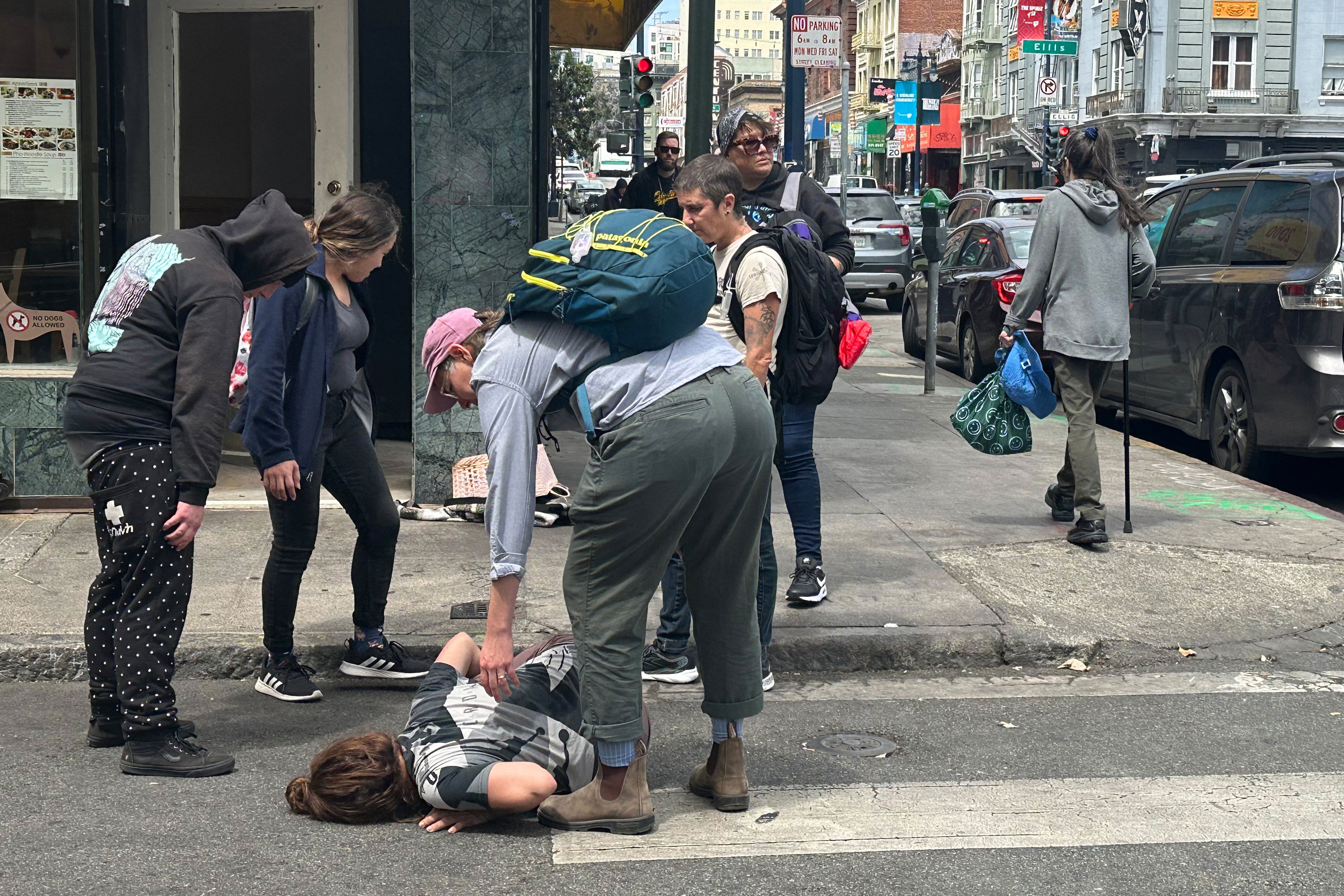
Politics of Homelessness
The statewide crackdown is enjoying out regardless of a rising physique of proof exhibiting that offering strong well being care, together with social companies and intensive case administration, can successfully transfer homeless individuals off the streets and enhance well being, whereas additionally saving taxpayer and well being care spending on expensive institutional care.
Democrats are embracing a get-tough method as public persistence wears skinny over the intractable disaster. Newsom’s stance isn’t fully new: Throughout his tenure as San Francisco mayor, from 2004 to 2011, he spearheaded controversial homelessness concepts, together with an ordinance generally known as sit/lie, which made it unlawful to take a seat or lie on public sidewalks.
Newsom and native leaders, together with Breed, say they need to steadiness guaranteeing public security and clear streets with a humane method to clearing camps, whereas attempting to get individuals indoors. Breed administration officers argue that whereas some homeless individuals do settle for shelter, many are opting to remain on the streets whereas declining therapy.
“People won’t accept shelter, and they won’t follow up on their medical care or behavioral health treatment or any of that, often because they need to stay and monitor their belongings, some of which are totally soiled and becoming a health hazard,” mentioned David Nakanishi, a scientific social employee who heads the Breed administration’s Wholesome Streets Operation Heart, which spearheads the sweeps.
In Los Angeles, in the meantime, road drugs supplier Brett Feldman is shedding his sufferers amid the sweeps. “It really undermines our housing efforts,” he mentioned.
A metropolis report launched in Could discovered that clearing camps and imposing anticamping legal guidelines that ban individuals from sleeping, sitting, or conserving belongings on sidewalks in sure delicate areas, together with college zones, parks, or freeway underpasses, isn’t successfully serving to individuals into housing. After spending roughly $3 million imposing anticamping legal guidelines from 2021 to 2023, the report discovered, town positioned simply two individuals into everlasting housing and 81% of encampment websites have been repopulated.
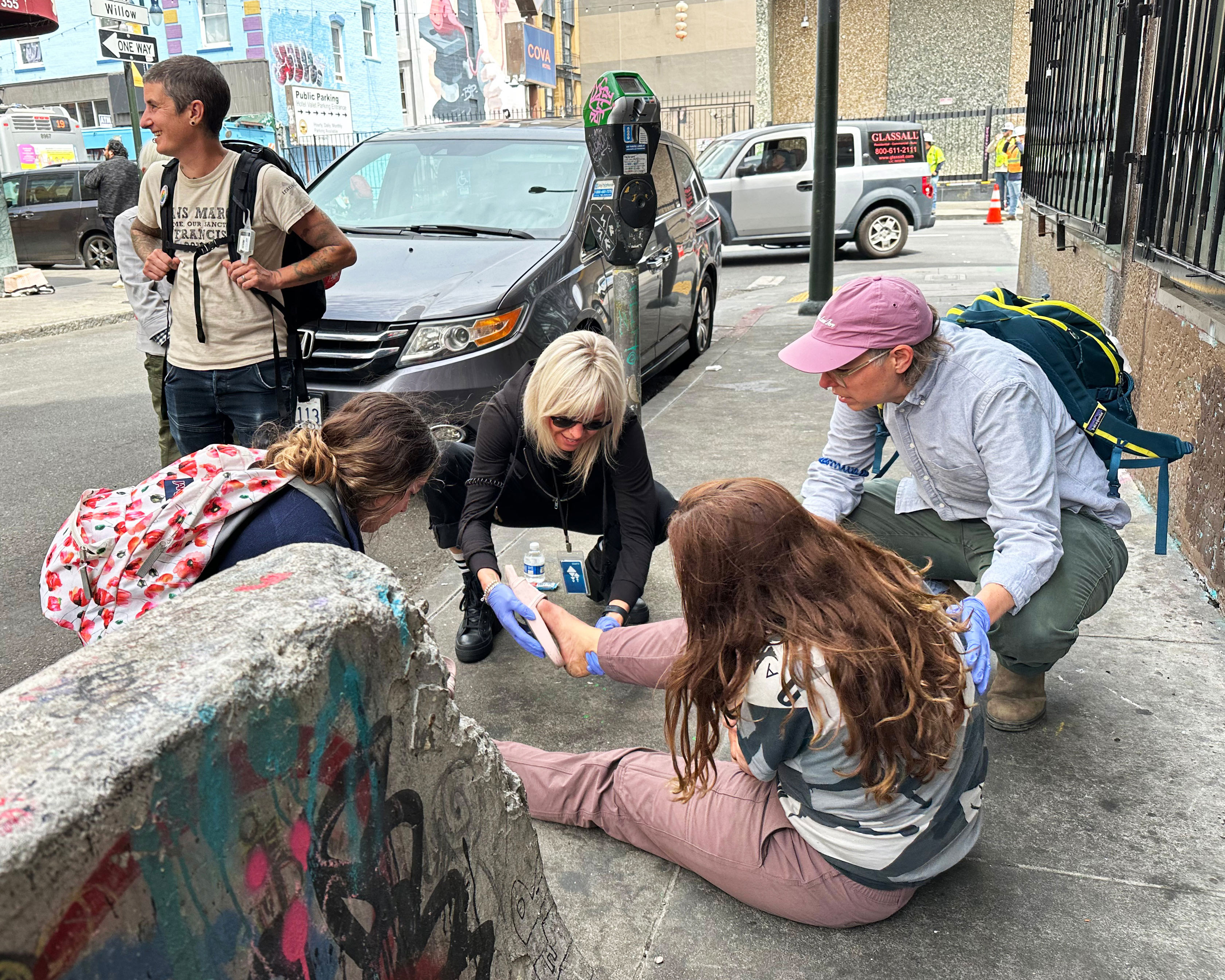
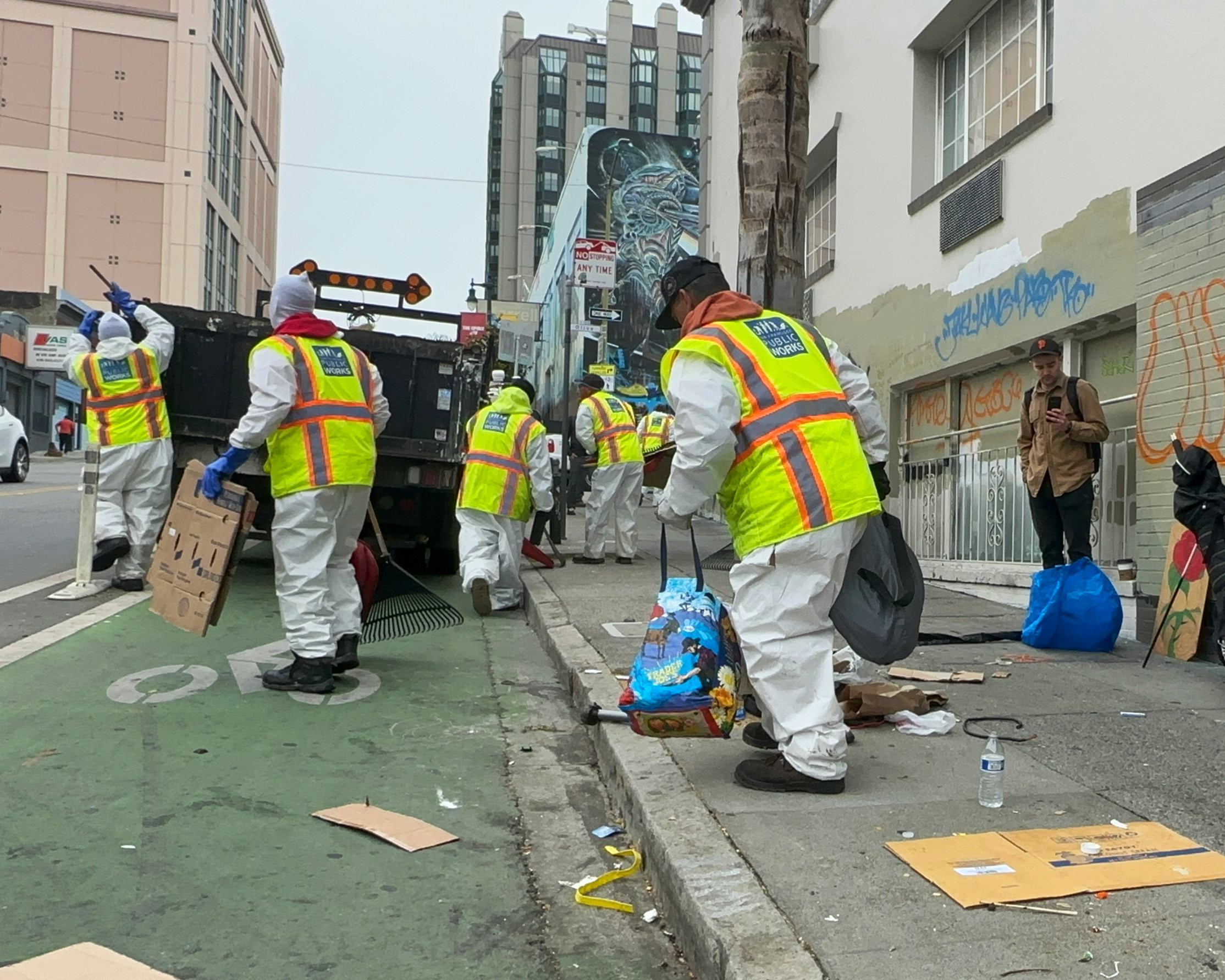
In a single central Los Angeles district the place legislation enforcement isn’t aggressively imposing anticamping legal guidelines, road homelessness fell roughly 38% in a one-year interval from 2023 to 2024, mentioned Indu Subaiya, interim CEO for the nonprofit Healthcare in Motion, which has been housing and treating sufferers there.
“We’re starting to actually see results and reductions in unsheltered homelessness,” Subaiya mentioned. “However, in Southern California counties aggressively enforcing Newsom’s executive order and clearing encampments, we’re seeing our patients and their medical conditions set back profoundly.”
As soon as Douglass was launched, he was again within the Tenderloin trying to find housing and popping his tent up the road from his earlier hangout.
“Every time I try to get my documents to get housing, I get knocked backwards,” he mentioned. “I guess the city thinks we all need to be in handcuffs.”
By the following morning, the encampment had grown twice in measurement.
Healthbeat is a nonprofit newsroom overlaying public well being printed by Civic Information Firm and KFF Well being Information. Join its newsletters right here.
This text was produced by KFF Well being Information, which publishes California Healthline, an editorially impartial service of the California Well being Care Basis.




